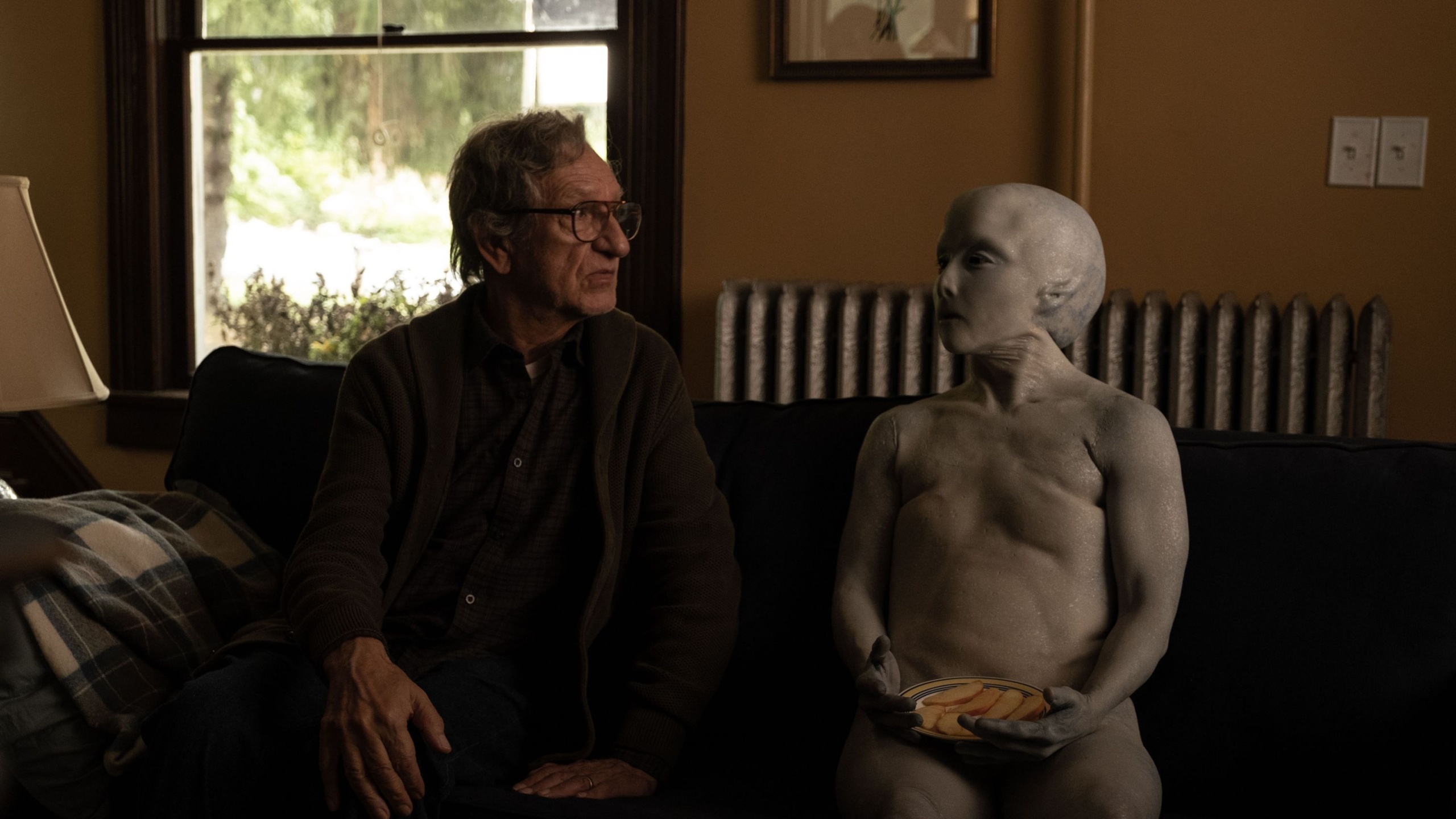To watch Marc Turtletaub’s “Jules” — a middlebrow dramedy starring Ben Kingsley as a widowed, half-senile eccentric so desperate for someone to care about him that he casually befriends the alien who crashes into his backyard — is to be reminded that truly strange movies have become hard to find. These days, a film this unusual is about as rare as a call from Milton’s estranged son, who hasn’t phoned home in several years.
Not that “Jules” would seem all that bizarre just by looking at it. On the contrary, this modest late summer whatsit looks and feels just like a million other milquetoast charmers aimed at audiences of a certain age, what with its reassuringly nice score and endless array of conflict-avoidant medium shots. The difference here is that those medium shots feature Sir Ben Kingsley sitting on a couch next to a silent and seemingly naked extraterrestrial — played with unnerving precision by stunt actress Jade Quon — who listens to him ramble about “C.S.I.” with the attentiveness of a besotted grandchild.
Is “Jules” a good movie? For a film that feels so milquetoast in most respects, I suppose that Gavin Steckler’s script is surprisingly honest about the hardships of aging, and its familiar observations about the support required to “survive” old age feel that much fresher because of the bizarre path this story travels to reach them. Saddled with a floofy hairpiece that seems fittingly alien to the actor’s head, Kingsley is also keyed-in to his character from the start, his performance sustained by a stubborn rejection of self-pity and a shaky refusal to show fear in the face of death.
Best of all, the other lonely weirdos in Milton’s western Pennsylvania Mayfield are played by the reliably crude Jane Curtin, whose Joyce is obsessed with her glory days of “going into the city,” and “Licorice Pizza” MVP Harriet Sansom Harris, whose Sandy is so desperate for connection that she prints flyers inviting local teens to come to her house and listen to her stories. Sandy is more of a plot device than a fully dimensional person, but Harris makes the most of every detail, and her reaction to seeing Jules sitting on Milton’s couch for the first time includes one of the single greatest line deliveries I’ve heard in my entire life.
And yet, for all of those virtues, “Jules” is never better than it is bizarre, and it’s only toward the very end — sometime after the titular alien’s mysterious obsession with cats is clarified in the weirdest way possible — that the film’s emotionality isn’t completely overshadowed by its oddness.
Of course, that oddness isn’t accidental. Turtletaub may be more accomplished as a producer than he is as a director, but he has a sturdy grasp on this material, and he does everything in his power to ensure that “Jules” reflects the dual strangenesses of Milton’s situation: The remarkable strangeness of someone turning their couch into an Airbnb for aliens, and the all too common strangeness of someone being deceived by their aging brain (Milton is just starting to misplace things, which means he’s also just on the cusp of realizing that he’ll never stop).
While “Jules” has some fun with how easily one of those phenomena might be used to explain the other, the film isn’t nearly deft enough to escape the narrow tractor beam of its premise. Painful as it is that Turtletaub devotes much of his first act to a repetitive series of (daily?) public meetings in which Milton and the rest of the local kooks complain to the mayor about changing the town slogan and things of that nature, the decision is made that much worse by the eventual realization that we only sat through all these scenes so that we could be in on the joke when everyone rolls their eyes at Milton’s complaints about the spaceship that’s supposedly crashed in his backyard and ruined his azaleas.
That mismatch between investment and payoff is a recurring motif in a movie that’s often too content with its own weirdness to work on any other grounds. “Jules” isn’t funny enough or heartbreaking enough or anything enough to meaningfully expand on its basic idea, and any part of it that doesn’t directly involve the alien itself suffers as a result. “Succession” actress Zoë Winters is especially hung out to dry as Milton’s daughter, her character reduced to a living symbol of the begrudging tolerance that adults often have for their burdensome parents.
Fortunately, whenever Jules is on screen, weirdness alone is more than enough to make this thing watchable. Perfectly straddling the line between cute and creepy, Quon’s discomfiting performance does more with a latex bodysuit and a pair of cold black eyes than a fortune’s worth of CGI could ever hope to accomplish. Jules’ tactile and ultra-attentive presence lends even the most innocent scenes an implicit sense sense of danger, and at certain points the sight of the alien on Milton’s couch is ominous enough to make you wonder if the movie’s nice and breezy post-Miramax vibe might be something of a trap; it isn’t, but one terrible moment of violence suggests that Turtletaub was at least thinking along those lines.
In Quon’s hands, Jules is able to remain at once both curious and curiosity itself, frighteningly unknown but endlessly fascinated by what Milton and his friends might have to say. Jules is the patient ear these people have always wanted, even if it’s unclear whether those jagged stab wounds on the side of its head are technically ears in the first place. The alien is also an invitation for Milton, Joyce, and Sandy to hear themselves in a new way — to give voice to the pain they’ve been forced to swallow since life began taking precious things from them. Sometimes, this peculiarly amusing film argues in its own special way, coming face-to-face with the weirdness that life throws your way can be the most important step towards learning how to live with it.
Grade: C+
Bleecker Street will release “Jules” in theaters on Friday, August 11.




